Kathleen Jones's Blog, page 21
May 29, 2016
Appleby Horse Fair - the fun begins
It's Appleby Horse Fair, and the town suddenly turns into the wild west as thousands and thousands of gypsies and tourists pour into it. For the travelers it's a get-together, a traditional horse trading event and there are harness races. For the tourists it's all very picturesque. This year the businesses in town are hoping to make enough money to make up for the devastation of the floods, and the sudden arrival of summer weather is an added bonus. But, sadly, there's another side to it.
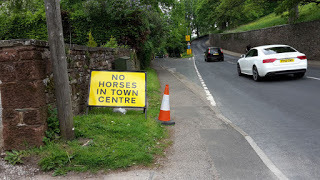
I've spent today erecting a fence against horses - and humans. Unfortunately very necessary. Last night there was a disturbance outside which I ignored, since there was only one of me and a group of very rowdy people on the river bank, but this morning the big, riverside door to the mill was lying face down on the riverbank and the ground floor open to the world. In town a shopfront had been smashed in and other damage reported. It's very sad that this ancient event has to be marred by violent public disorder. A few individuals.
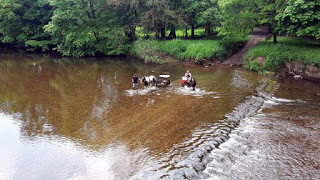 The horse on the left had to be led through the ford - he was terrifiedI love watching the horses being put through their paces. Today there were several young horses being introduced to the water for the first time - one or two were very reluctant.
The horse on the left had to be led through the ford - he was terrifiedI love watching the horses being put through their paces. Today there were several young horses being introduced to the water for the first time - one or two were very reluctant.
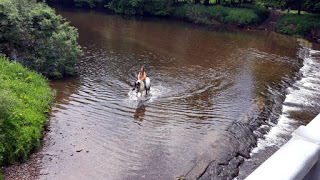
Others were loving it.
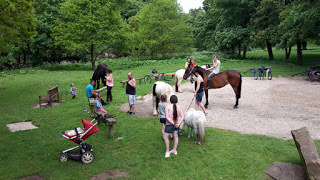
And there were the usual family gatherings for washing and grooming. I have a feeling that the fair is going to be very busy this year - so many horses and people so early (it hasn't officially started yet) is a good sign.
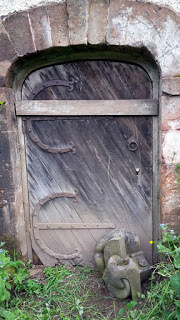 Temporary fixI'm going to bed tonight feeling a little more secure, with the fence almost complete and the door hammered back into its frame and secured by boards. The drawbridge is up and the boiling oil on the hob!
Temporary fixI'm going to bed tonight feeling a little more secure, with the fence almost complete and the door hammered back into its frame and secured by boards. The drawbridge is up and the boiling oil on the hob!

I've spent today erecting a fence against horses - and humans. Unfortunately very necessary. Last night there was a disturbance outside which I ignored, since there was only one of me and a group of very rowdy people on the river bank, but this morning the big, riverside door to the mill was lying face down on the riverbank and the ground floor open to the world. In town a shopfront had been smashed in and other damage reported. It's very sad that this ancient event has to be marred by violent public disorder. A few individuals.
 The horse on the left had to be led through the ford - he was terrifiedI love watching the horses being put through their paces. Today there were several young horses being introduced to the water for the first time - one or two were very reluctant.
The horse on the left had to be led through the ford - he was terrifiedI love watching the horses being put through their paces. Today there were several young horses being introduced to the water for the first time - one or two were very reluctant.
Others were loving it.

And there were the usual family gatherings for washing and grooming. I have a feeling that the fair is going to be very busy this year - so many horses and people so early (it hasn't officially started yet) is a good sign.
 Temporary fixI'm going to bed tonight feeling a little more secure, with the fence almost complete and the door hammered back into its frame and secured by boards. The drawbridge is up and the boiling oil on the hob!
Temporary fixI'm going to bed tonight feeling a little more secure, with the fence almost complete and the door hammered back into its frame and secured by boards. The drawbridge is up and the boiling oil on the hob!
Published on May 29, 2016 15:08
May 22, 2016
Sunday Book: The Green Road by Anne Enright
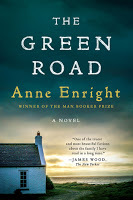
This has been on my bedside table ever since it came out in paperback, waiting for the right moment. I tend to read non-fiction when I'm writing fiction and novels when I'm writing non-fiction. I've been deep into The Green Road this week. I love Anne Enright's way with words, the spare, laconic dialogue that says only as much as you need to know about the characters' emotional states and their relationships with each other. I love the metaphors and the images - always used sparingly and never wasted. This is Rosaleen trying to describe the fragmentation of her own mind. She feels as though she is wearing someone else's coat and living in someone else's house:
'Rosaleen was living in the wrong house, with the wrong colours on the walls, and no telling any more what the right colour might be, even though she had chosen them herself and liked them and lived with them for years. And where could you put yourself: if you could not feel at home in your own home? If the world turned into a series of lines and shapes, with nothing in the pattern to remind you what it was for.'
The family story is told in a series of episodes across several decades, each one centering on a different member of the family. It's an interesting structure that presents a fascinating portrait of the Madigans and their journey towards independent lives. There is Hanna, the youngest daughter, sensitive as an open wound; Dan, the eldest son, struggling with the call of religion and his own sexuality; Emmet expiates his guilt by becoming a charity worker, using his work to escape irksome family ties; Constance, the eldest, feels most responsibility for her manipulative, self-involved mother and dreams of escape.
And then there is the narrow, green road to Boolavaun, their father's old home where their grandmother lives without any modern conveniences and wrings the necks of chickens for their Sunday dinner. It symbolises their roots, which are always trying to draw them down despite their mother's ambitions. She is a Considine, a cut above the Madigans she married into.
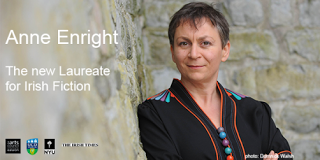 Anne Enright was made Irish Laureate in 2015, based in University College DublinIt's a very Irish novel, set in an Ireland already feeling the push and pull of Europe's Celtic Tiger. Everyone is out to make a quick Euro, but the old Ireland is still there underneath threatening to undermine it all. The legacies of conflict, of famine and separation, the influence of the Catholic church are only just beneath the skin. They're never specifically mentioned, but are a given - the sub-text of everyone's lives.
Anne Enright was made Irish Laureate in 2015, based in University College DublinIt's a very Irish novel, set in an Ireland already feeling the push and pull of Europe's Celtic Tiger. Everyone is out to make a quick Euro, but the old Ireland is still there underneath threatening to undermine it all. The legacies of conflict, of famine and separation, the influence of the Catholic church are only just beneath the skin. They're never specifically mentioned, but are a given - the sub-text of everyone's lives.In the second half of the novel, Rosaleen summons them all home for Christmas for a reunion that will be as momentous and difficult as they anticipate. It is beautifully written to the very last word; prose that rolls around in your mind, echoing in your ear, as the flavour of a particularly delicious meal, eaten slowly, lingers on the taste buds.
The Green Road
by Anne Enright
Penguin Random House UK
Published on May 22, 2016 08:12
May 17, 2016
Tuesday Poem: 'Stone' by Em Strang
1
The Nights are the hardest.
It’s the time of year, the harsh wind.
But the truth is
the horses have left; they’re not lost.
“Excuse me, I’ve lost two horses.
One’s grey with pit-black eyes
and the other’s called Nightbird.
Have you seen them?”
Her yard is awash with the wind - rolling buckets
and bits of plastic flicking in the gloom.
She’s standing there in old black boots
and trousers two sizes too big for her.
She’s familiar, but I don’t know how.
“Neither seen nor heard,” she smiles.
But she knows what horses look like.
She knows they have strong legs and tails,
that they cross fields we can’t see,
from one white world to another,
somewhere warmer, somewhere brighter.
I’m waiting in the cold with a straight back
and broad shoulders, trying to hold the place up;
to slow things down and bring something back,
not just my horses. . .
Extract from Stone by Em Strang
illustrated by Mat Osmond
Reproduced with permission
Published by Atlantic Press, 2016
www.atlanticpressbooks.com
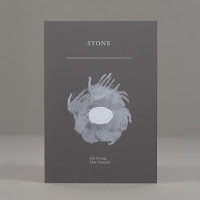
I listened to Em Strang perform this long sequence at The Stove in Dumfries. The curtains were drawn, the candles were lit and in the audience there was the silent anticipation of storytelling. Hearing a poem actually performed, from memory, is a wonderful thing. It comes alive as part of a dialogue between poet and listener. The performance was further electrified by Em Strang’s elegiac interjections into the poem, between sections, in another language. It sounded like Old Norse, or Icelandic - ancient, declamatory, pleading - and it made the hair on the back of the neck stand up. Later, Em explained that the sounds are made in the demands of the moment, like improvised music. In another place and time it would have been called ‘speaking in tongues’. In the room above the café at The Stove it had a shamanic quality and it suited the poem, which has all the characteristics of a folk tale - mysterious, dark, and powerful.
It begins with the arrival of a stranger:
“I’ve brought you something,” she says,
putting her hand in her pocket
and holding the thing out.
But, like most of the gifts in fairy tales, this one is loaded with significance.
The gift is hidden in a rag
and weighs more than I thought.
It is a stone, smooth and perfectly shaped as an egg. Things begin to go wrong, the horses leave and even the climate begins to behave differently.
The long, cold nights begin in May or June
and seem to go on forever
as though there are no years anymore,
there are no seasons.
In February I’ve seen hawthorn flower
and fruit swell
and swallows come.
It’s hard to tell,
but the horses left in June, I think.
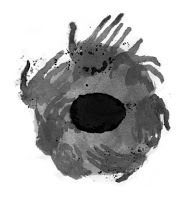
The illustrations, by Mat Osmond, fit the text beautifully. This is a poem I will go back to often. If you get the chance to listen to Em Strang performing Stone, then don’t miss it!
Stone
by Em Strang
Illustrated by Mat Osmond
Published by Atlantic Press
www.atlanticpressbooks.com
Em Strang is one of the editors of the Dark Mountain Project and her first collection, Bird-Woman, is coming out with Shearsman in September 2016.
The Nights are the hardest.
It’s the time of year, the harsh wind.
But the truth is
the horses have left; they’re not lost.
“Excuse me, I’ve lost two horses.
One’s grey with pit-black eyes
and the other’s called Nightbird.
Have you seen them?”
Her yard is awash with the wind - rolling buckets
and bits of plastic flicking in the gloom.
She’s standing there in old black boots
and trousers two sizes too big for her.
She’s familiar, but I don’t know how.
“Neither seen nor heard,” she smiles.
But she knows what horses look like.
She knows they have strong legs and tails,
that they cross fields we can’t see,
from one white world to another,
somewhere warmer, somewhere brighter.
I’m waiting in the cold with a straight back
and broad shoulders, trying to hold the place up;
to slow things down and bring something back,
not just my horses. . .
Extract from Stone by Em Strang
illustrated by Mat Osmond
Reproduced with permission
Published by Atlantic Press, 2016
www.atlanticpressbooks.com

I listened to Em Strang perform this long sequence at The Stove in Dumfries. The curtains were drawn, the candles were lit and in the audience there was the silent anticipation of storytelling. Hearing a poem actually performed, from memory, is a wonderful thing. It comes alive as part of a dialogue between poet and listener. The performance was further electrified by Em Strang’s elegiac interjections into the poem, between sections, in another language. It sounded like Old Norse, or Icelandic - ancient, declamatory, pleading - and it made the hair on the back of the neck stand up. Later, Em explained that the sounds are made in the demands of the moment, like improvised music. In another place and time it would have been called ‘speaking in tongues’. In the room above the café at The Stove it had a shamanic quality and it suited the poem, which has all the characteristics of a folk tale - mysterious, dark, and powerful.
It begins with the arrival of a stranger:
“I’ve brought you something,” she says,
putting her hand in her pocket
and holding the thing out.
But, like most of the gifts in fairy tales, this one is loaded with significance.
The gift is hidden in a rag
and weighs more than I thought.
It is a stone, smooth and perfectly shaped as an egg. Things begin to go wrong, the horses leave and even the climate begins to behave differently.
The long, cold nights begin in May or June
and seem to go on forever
as though there are no years anymore,
there are no seasons.
In February I’ve seen hawthorn flower
and fruit swell
and swallows come.
It’s hard to tell,
but the horses left in June, I think.

The illustrations, by Mat Osmond, fit the text beautifully. This is a poem I will go back to often. If you get the chance to listen to Em Strang performing Stone, then don’t miss it!
Stone
by Em Strang
Illustrated by Mat Osmond
Published by Atlantic Press
www.atlanticpressbooks.com
Em Strang is one of the editors of the Dark Mountain Project and her first collection, Bird-Woman, is coming out with Shearsman in September 2016.
Published on May 17, 2016 11:38
May 15, 2016
Gardening, Poetry and thoughts on Belonging.
No Sunday book this week - I've been too busy trying to salvage the flood-wrecked garden while the beautiful weather lasts, and putting together a workshop on Home and Belonging. There's nothing like gardening for making you think about the latter. It's a long-term occupation. A magnolia tree I planted twenty years ago has only recently grown as tall as me. It has survived, though I've lost a wisteria that took seven years to flower but died because it didn't enjoy having its roots in a swimming pool.
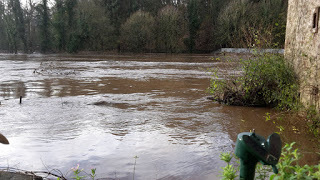 That was my garden under there - 4 times in December!
That was my garden under there - 4 times in December!
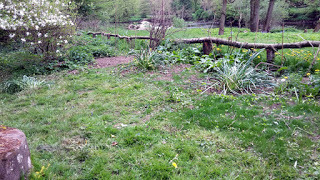 This is what it looks like now, with a temporary fenceI've lost most of my beautiful old roses, a thick flowering hedge more than two metres high, nurtured for a couple of decades. I mourn their poetic identities. Mme Albert Carriere, Cardinal Richelieu, the Queen of Denmark, Park Direktor Riggers. My Scottish rose, Stanwell Perpetual, appeared to be making a recovery, but has since had a relapse. Only the deep red Dublin Bay (pruned to a skeleton) and the French aristocrat Giselaine de Feligonde seem unperturbed. The Rambling Rector is still rambling and Paul's Himalayan Musk as rampant as ever, though both had to be drastically cut back to untangle flood debris.
This is what it looks like now, with a temporary fenceI've lost most of my beautiful old roses, a thick flowering hedge more than two metres high, nurtured for a couple of decades. I mourn their poetic identities. Mme Albert Carriere, Cardinal Richelieu, the Queen of Denmark, Park Direktor Riggers. My Scottish rose, Stanwell Perpetual, appeared to be making a recovery, but has since had a relapse. Only the deep red Dublin Bay (pruned to a skeleton) and the French aristocrat Giselaine de Feligonde seem unperturbed. The Rambling Rector is still rambling and Paul's Himalayan Musk as rampant as ever, though both had to be drastically cut back to untangle flood debris.
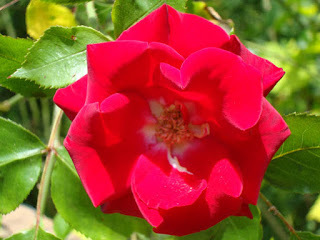 Parkdirektor Riggers RIP
Parkdirektor Riggers RIP
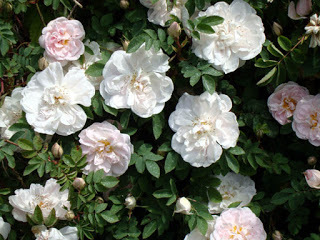 Stanwell Perpetual in better daysMeanwhile, I've been preparing for a workshop on Home and Belonging and what they mean to us. It's such a complicated thing - we use 'home' in such a loose way and although it ought to be a comforting safe environment, often it isn't. Belonging is very personal - why do we feel, passionately, that we belong in particular places - places we may not have any close connection to? It made me think very deeply about cultural identity and environmental attachment and migrancy and exile and how we can carry the knowledge of who we are with us wherever we go. American author Barbara Kingsolver, writing about the displacement of First Nation people by western settlers, put it this way: ‘They called their refugee years The Time When We were Not, and they were forgiven, because they had carried the truth of themselves in a sheltered place inside the flesh, exactly the way a fruit that has gone soft still carries inside itself the clean, hard stone of its future.’
Stanwell Perpetual in better daysMeanwhile, I've been preparing for a workshop on Home and Belonging and what they mean to us. It's such a complicated thing - we use 'home' in such a loose way and although it ought to be a comforting safe environment, often it isn't. Belonging is very personal - why do we feel, passionately, that we belong in particular places - places we may not have any close connection to? It made me think very deeply about cultural identity and environmental attachment and migrancy and exile and how we can carry the knowledge of who we are with us wherever we go. American author Barbara Kingsolver, writing about the displacement of First Nation people by western settlers, put it this way: ‘They called their refugee years The Time When We were Not, and they were forgiven, because they had carried the truth of themselves in a sheltered place inside the flesh, exactly the way a fruit that has gone soft still carries inside itself the clean, hard stone of its future.’
Place seems particularly important to writers and so many of the great writers have been exiles - James Joyce in England and France, Katherine Mansfield in Europe, D.H. Lawrence in Italy and Mexico - it's a very long and interesting list. Is there something about exile and 'not-belonging' that inspires writers to create? The philosopher Edward Said said that we are all 'creating a house of words to dwell in', and I love that image.
On Saturday evening, after the workshop I drove north into Scotland to Dumfries, to an evening of 'eco-poetics' called Wheat, Otter, and Stone , featuring three amazing poets, Susan Richardson, Em Strang and David Mark Williams. One of the things I loved best about the reading, was that it wasn't a reading but a performance. Seeing and hearing poets perform their work from memory is a whole other experience! The theme fitted with everything I'd been working through in the morning - our relationship to the landscape around us, and the way we interact with it in the process of 'belonging'. Eco-poetics, I've discovered comes from two Greek words: oikos [meaning household or family] and poïesis [making, or creating], so that it quite literally means the creation of a dwelling place, or home-making.
 That was my garden under there - 4 times in December!
That was my garden under there - 4 times in December! This is what it looks like now, with a temporary fenceI've lost most of my beautiful old roses, a thick flowering hedge more than two metres high, nurtured for a couple of decades. I mourn their poetic identities. Mme Albert Carriere, Cardinal Richelieu, the Queen of Denmark, Park Direktor Riggers. My Scottish rose, Stanwell Perpetual, appeared to be making a recovery, but has since had a relapse. Only the deep red Dublin Bay (pruned to a skeleton) and the French aristocrat Giselaine de Feligonde seem unperturbed. The Rambling Rector is still rambling and Paul's Himalayan Musk as rampant as ever, though both had to be drastically cut back to untangle flood debris.
This is what it looks like now, with a temporary fenceI've lost most of my beautiful old roses, a thick flowering hedge more than two metres high, nurtured for a couple of decades. I mourn their poetic identities. Mme Albert Carriere, Cardinal Richelieu, the Queen of Denmark, Park Direktor Riggers. My Scottish rose, Stanwell Perpetual, appeared to be making a recovery, but has since had a relapse. Only the deep red Dublin Bay (pruned to a skeleton) and the French aristocrat Giselaine de Feligonde seem unperturbed. The Rambling Rector is still rambling and Paul's Himalayan Musk as rampant as ever, though both had to be drastically cut back to untangle flood debris. Parkdirektor Riggers RIP
Parkdirektor Riggers RIP Stanwell Perpetual in better daysMeanwhile, I've been preparing for a workshop on Home and Belonging and what they mean to us. It's such a complicated thing - we use 'home' in such a loose way and although it ought to be a comforting safe environment, often it isn't. Belonging is very personal - why do we feel, passionately, that we belong in particular places - places we may not have any close connection to? It made me think very deeply about cultural identity and environmental attachment and migrancy and exile and how we can carry the knowledge of who we are with us wherever we go. American author Barbara Kingsolver, writing about the displacement of First Nation people by western settlers, put it this way: ‘They called their refugee years The Time When We were Not, and they were forgiven, because they had carried the truth of themselves in a sheltered place inside the flesh, exactly the way a fruit that has gone soft still carries inside itself the clean, hard stone of its future.’
Stanwell Perpetual in better daysMeanwhile, I've been preparing for a workshop on Home and Belonging and what they mean to us. It's such a complicated thing - we use 'home' in such a loose way and although it ought to be a comforting safe environment, often it isn't. Belonging is very personal - why do we feel, passionately, that we belong in particular places - places we may not have any close connection to? It made me think very deeply about cultural identity and environmental attachment and migrancy and exile and how we can carry the knowledge of who we are with us wherever we go. American author Barbara Kingsolver, writing about the displacement of First Nation people by western settlers, put it this way: ‘They called their refugee years The Time When We were Not, and they were forgiven, because they had carried the truth of themselves in a sheltered place inside the flesh, exactly the way a fruit that has gone soft still carries inside itself the clean, hard stone of its future.’ Place seems particularly important to writers and so many of the great writers have been exiles - James Joyce in England and France, Katherine Mansfield in Europe, D.H. Lawrence in Italy and Mexico - it's a very long and interesting list. Is there something about exile and 'not-belonging' that inspires writers to create? The philosopher Edward Said said that we are all 'creating a house of words to dwell in', and I love that image.
On Saturday evening, after the workshop I drove north into Scotland to Dumfries, to an evening of 'eco-poetics' called Wheat, Otter, and Stone , featuring three amazing poets, Susan Richardson, Em Strang and David Mark Williams. One of the things I loved best about the reading, was that it wasn't a reading but a performance. Seeing and hearing poets perform their work from memory is a whole other experience! The theme fitted with everything I'd been working through in the morning - our relationship to the landscape around us, and the way we interact with it in the process of 'belonging'. Eco-poetics, I've discovered comes from two Greek words: oikos [meaning household or family] and poïesis [making, or creating], so that it quite literally means the creation of a dwelling place, or home-making.
Published on May 15, 2016 15:27
May 9, 2016
Tuesday Poem: Captain Fly's Bucket List - Agnes Marton
Fasten your seat belt and prepare to take off for a unique experience. There's a warning from the poet at the beginning to expect 'non-existent words, distortions, unusual punctuation and layout, mixtures of different languages' and strange juxtapositions. It's poetry then!
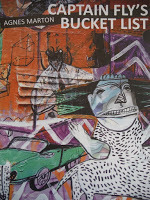
Agnes Marton is a linguist speaking Hungarian, English and several other European languages fluently. Playing with words comes naturally in this collection of poems. She is also a highly original visual artist and that also informs her work. Captain Fly is the hero of this collection:
'I've been to soup and sauce and horseshit
humming my zazzy-zilchy hymns,
proud 24/7
of my unmarked wings.'
He watches 'the blurred Wolf Moon/through canopied lids'. 'I want it all,' he sings, becoming a metaphor for capitalist economics.
'I want to be the Demon of the Compost Heaps,
full but hungry.'
Unfamiliar uses and juxtapositions of language challenge and disturb the reader, presenting the invented vocabularies of magical beasts. One section is called 'Sharkening', there are 'twink-attracting forces', and mentions of the 'infiltrating Solange'. Sometimes the linguistic gymnastics seem to go too far and then suddenly they amaze and delight.
Sleipnir
Not my hoof! I am swirling,
I am the thunder, I am the stars.
Who else and what for?
The don't-you-hurt guys,
The stunt. Coffee with white crime.
Poach as approach, uneasy,
Inox traps shining nighttime.
This is poetry at the edge of understanding. We need it. We need people taking big risks and pushing boundaries to take the stiff upper-lip and starched shirt out of an art form that has become (in the UK anyway) increasingly institutionalised. Once you make poetry a university discipline you put it into a strait-jacket - even Captain Fly can't in one of those! Without subversive voices it leads either to a uniform pap or silence.
Legacy
My grandfather was a safari soul.
He slipped away
before it became a trend.
He sent a lion's tail -
quite a gift.
We used it as a duster.
*
I collect postcards of the wild.
We don't have albums
with faces to cheer.
*
Cat got my grandmother's tongue,
my mother's tongue.
I inherited roaring silence.
Copyright Agnes Marton 2016
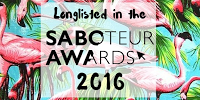 Captain Fly's Bucket List was launched at the Poetry Society in London on the 5th March and music composed by Vasiliki Legaki as a setting for 7 of the poems was performed in London on the same day. Published in English in Budapest and not available on Amazon (like many small poetry presses).
Captain Fly's Bucket List was launched at the Poetry Society in London on the 5th March and music composed by Vasiliki Legaki as a setting for 7 of the poems was performed in London on the same day. Published in English in Budapest and not available on Amazon (like many small poetry presses).
More details about the collection and orders at this website
Agnes will be the Festival Poet at the Mondorf Art Festival in Luxembourg in June 2016.
Captain Fly's Bucket List has been long-listed for a Saboteur Award.

Agnes Marton is a linguist speaking Hungarian, English and several other European languages fluently. Playing with words comes naturally in this collection of poems. She is also a highly original visual artist and that also informs her work. Captain Fly is the hero of this collection:
'I've been to soup and sauce and horseshit
humming my zazzy-zilchy hymns,
proud 24/7
of my unmarked wings.'
He watches 'the blurred Wolf Moon/through canopied lids'. 'I want it all,' he sings, becoming a metaphor for capitalist economics.
'I want to be the Demon of the Compost Heaps,
full but hungry.'
Unfamiliar uses and juxtapositions of language challenge and disturb the reader, presenting the invented vocabularies of magical beasts. One section is called 'Sharkening', there are 'twink-attracting forces', and mentions of the 'infiltrating Solange'. Sometimes the linguistic gymnastics seem to go too far and then suddenly they amaze and delight.
Sleipnir
Not my hoof! I am swirling,
I am the thunder, I am the stars.
Who else and what for?
The don't-you-hurt guys,
The stunt. Coffee with white crime.
Poach as approach, uneasy,
Inox traps shining nighttime.
This is poetry at the edge of understanding. We need it. We need people taking big risks and pushing boundaries to take the stiff upper-lip and starched shirt out of an art form that has become (in the UK anyway) increasingly institutionalised. Once you make poetry a university discipline you put it into a strait-jacket - even Captain Fly can't in one of those! Without subversive voices it leads either to a uniform pap or silence.
Legacy
My grandfather was a safari soul.
He slipped away
before it became a trend.
He sent a lion's tail -
quite a gift.
We used it as a duster.
*
I collect postcards of the wild.
We don't have albums
with faces to cheer.
*
Cat got my grandmother's tongue,
my mother's tongue.
I inherited roaring silence.
Copyright Agnes Marton 2016
 Captain Fly's Bucket List was launched at the Poetry Society in London on the 5th March and music composed by Vasiliki Legaki as a setting for 7 of the poems was performed in London on the same day. Published in English in Budapest and not available on Amazon (like many small poetry presses).
Captain Fly's Bucket List was launched at the Poetry Society in London on the 5th March and music composed by Vasiliki Legaki as a setting for 7 of the poems was performed in London on the same day. Published in English in Budapest and not available on Amazon (like many small poetry presses).More details about the collection and orders at this website
Agnes will be the Festival Poet at the Mondorf Art Festival in Luxembourg in June 2016.
Captain Fly's Bucket List has been long-listed for a Saboteur Award.
Published on May 09, 2016 15:30
May 8, 2016
Sunday Book: If Women Rose Rooted, by Sharon Blackie
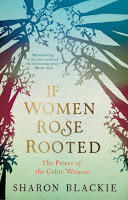
You know it’s a good book when you feel compelled to scribble all over it, underlining sentences, writing YES!! in the margins. This book isn’t just good, it should be required reading for every woman over 16 and men too.
It makes important statements. I was one of those women in the 70s and 80s who felt excluded by feminism because I actually liked men, and I was also worried by the messages it gave out - that you could have it all, that you could shatter the glass ceiling by storming the men’s elevator, dressed in a suit. Equality became simply the right to walk in men’s shoes. “There were a lot of women who believed that the only way to succeed was to out-man the men," Sharon Blackie observes. Feminism dis-empowered women by devaluing the qualities of Femaleness that made them powerful. Feminism inadvertently reinforced patriarchy instead of challenging its fundamental values. A 19th century poet observed that ‘There is no equality that does not take account of Difference.’ To make people ‘the same’ is not to make them equal.
One of the passages I underlined in the book is this:
“ . . . when women seek success and ‘equality’ in a male-dominated world, then in order to achieve it we must act like men, play by their rules and, if they deign to allow us, join their societies and institutions. We are judged by masculine criteria for success - and inevitably we fall short, because we are not men.”
We live in a deeply patriarchal world – most politicians, lawyers, scientists and corporate directors are men. You have only to look at photographs of international conferences - the G20, COP21, NATO, the UN, the European Commission, to see the truth of that. Rows of grey suits with the occasional woman in a coloured jacket - like something from a ‘spot the odd one out’ game. There are good reasons for this. It begins with a story common to three of the world’s major religions, who have shaped, and still dominate, a large part of the world’s history and politics. It affected me, as it affected Sharon, at a fundamental level it is hard to escape from.
“The story I was given to carry as a very young child, the story which both defined me and instructed me about the place I occupied in this world, accorded no . . . significance to women. In this story, woman was an afterthought, created from a man’s body for the sole purpose of pleasing him . In this story, the first woman was the cause of all humanity’s sufferings: she brought death to the world, not life. She had the audacity to talk to a serpent.”
This story has had consequences, not just for our major institutions and the deep psychology of our culture. It has led us to the current crisis, both economic and climatic. The world that men have made isn’t working. “Our patriarchal, warmongering, growth-and-domination-based culture has caused runaway climate change, the mass extinction of species, and the ongoing destruction of wild and natural landscapes in the unstoppable pursuit of progress.” More women live in fear of violence or displacement than ever before. Something needs to change.
And what needs to change is the empowerment of half the world’s population by realising the potential of older stories which validated the particular strength of women – mythologies we categorised as pagan and therefore as forbidden knowledge. These still exist among indigenous, First Nation people – where the male and female principles are in balance, two halves of a whole, each equally valuable and both necessary for a healthy environment.
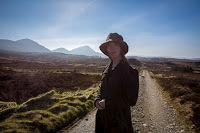 Sharon Blackie near her home in DonegalThe environmental consequences of a male dominated, corporate, capitalist culture, are catastrophic. Think Alberta Tar Sands. First Nation women are among the most prominent groups resisting their expansion, and they are being very effective. They aren’t hampered by a cultural narrative that tells them that ‘God had indeed given humans dominion over nature – and over women’. It was this thinking that ‘paved the way for the nineteenth century Industrial Revolution, which systematically laid waste to the planet on a previously unimaginable scale, and at an unprecedented speed.’ It also fostered the belief that ‘we are separate from nature’ and above it, which has had such tragic consequences. Sharon Blackie knows about this stuff - for quite a long time she was part of the corporate culture in Britain and the USA.
Sharon Blackie near her home in DonegalThe environmental consequences of a male dominated, corporate, capitalist culture, are catastrophic. Think Alberta Tar Sands. First Nation women are among the most prominent groups resisting their expansion, and they are being very effective. They aren’t hampered by a cultural narrative that tells them that ‘God had indeed given humans dominion over nature – and over women’. It was this thinking that ‘paved the way for the nineteenth century Industrial Revolution, which systematically laid waste to the planet on a previously unimaginable scale, and at an unprecedented speed.’ It also fostered the belief that ‘we are separate from nature’ and above it, which has had such tragic consequences. Sharon Blackie knows about this stuff - for quite a long time she was part of the corporate culture in Britain and the USA. In ancient times, women were often the guardians and protectors of the natural world. Sharon Blackie wants us to re-take that role. We need to “remake the world in the image of [the ancient] stories. To respect and revere ourselves and so to bring about a world in which women are respected and revered, recognised once again as holding the life-giving power of the Earth itself. We can reclaim that image in each of us: the creative, ecstatic, powerful feminine that each of us embodies in our own unique way. Lacking it, it is no wonder that we are grieving, alienated, imbalanced – that we cannot find a way to belong to a world which denies us permission to be what we are, and which teaches us to cover up not just our bodies but our feelings, our dreams, our intuition.”
This may sound a bit ‘new agey’ and I can hear a slightly mocking, sceptical laugh or two out there. But it is a profound truth. If we are going to save ourselves from the terrible consequences of human-created climate change, then women have a big role to play. Throughout the Climate Change Movement, it is women – many of them First Nation – who are leading the way. Naomi Klein is among the most prominent female voices in the world today. If you’ve read This Changes Everything (and if you haven’t, why not?) Then you must read ‘If Women Rose Rooted’.
If Women Rose Rooted . . . The power of Celtic woman
by Sharon Blackie
September Publishing 2016
Published on May 08, 2016 03:55
May 3, 2016
Tuesday Poem: The Zulu Girl - Roy Campbell
When in the sun the hot red acres smoulder,
Down where the sweating gang its labour plies,
A girl flings down her hoe, and from her shoulder
Unslings her child tormented by the flies.
She takes him to a ring of shadow pooled
By thorn-trees: purpled with the blood of ticks,
While her sharp nails, in slow caresses ruled,
Prowl through his hair with sharp electric clicks,
His sleepy mouth, plugged by the heavy nipple,
Tugs like a puppy, grunting as he feeds:
Through his frail nerves her own deep languors ripple
Like a broad river sighing through its reeds.
Yet in that drowsy stream his flesh imbibes
An old unquenched unsmotherable heat—
The curbed ferocity of beaten tribes,
The sullen dignity of their defeat.
Her body looms above him like a hill
Within whose shade a village lies at rest,
Or the first cloud so terrible and still
That bears the coming harvest in its breast.
Roy Campbell
Adamastor
1930 Faber and Faber
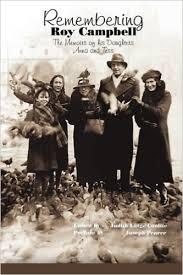 A Memoir written by his daughtersThe South African poet,
Roy Campbell
, isn't much read these days, which is a pity. TS Eliot thought he was one of the best of the poets to emerge between the wars. I find his work very powerful - like Dylan Thomas, he sometimes seems drunk with words and rhythms and a passion I personally find intoxicating. He was also, like Dylan Thomas, a bit of a hell-raiser (they once tried to out-drink each other), apologising to his wife in poetry - describing her as a woman who had been 'through all earthly treasons true' - though that poem was written in 1929 before he found out about her own indiscretions! Roy, in his life, out-played that by-word for swash-buckling - Ernest Hemingway. But, after his support for Franco in the Spanish Civil War, Roy Campbell was quietly 'blacklisted' in the conservative literary community. Fascism was dangerously out of fashion.
A Memoir written by his daughtersThe South African poet,
Roy Campbell
, isn't much read these days, which is a pity. TS Eliot thought he was one of the best of the poets to emerge between the wars. I find his work very powerful - like Dylan Thomas, he sometimes seems drunk with words and rhythms and a passion I personally find intoxicating. He was also, like Dylan Thomas, a bit of a hell-raiser (they once tried to out-drink each other), apologising to his wife in poetry - describing her as a woman who had been 'through all earthly treasons true' - though that poem was written in 1929 before he found out about her own indiscretions! Roy, in his life, out-played that by-word for swash-buckling - Ernest Hemingway. But, after his support for Franco in the Spanish Civil War, Roy Campbell was quietly 'blacklisted' in the conservative literary community. Fascism was dangerously out of fashion.He was also at swords-drawn with the Bloomsbury Group who he referred to as 'Bloodless parasites' and condemned them as a literary elite who harmed the development of literature. The fact that his wife had a passionate affair with Vita Sackville West sealed their fate and he published a lively satire called the Georgiad full of vindictive rage.
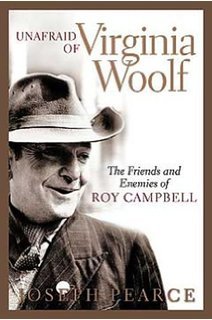
In other spheres he used his satirical gifts to great effect. On contemporary South African novelists, and their failure to get to grips with the realities of the political situation there, he wrote:
'You praise the firm restraint with which they write -
I'm with you there, of course:
They use the snaffle and the curb all right,
But where's the bloody horse?'
In Zulu Girl there's a sense of brooding horror about to be unleashed. It's a warning that is not only prescient of twentieth century South African history, but has a warning for us too. We're leaving Syrian and Iraqi children to starve in refugee camps in acres of mud without facilities, having closed the doors on their parents. How will they regard us when they grow up? What consequences are we so blindly creating for the future? There is no ambiguity in our situation - it is 'the first cloud so terrible and still' of the approaching storm, 'that bears the coming harvest in its breast'.
Roy Campbell was killed in a car crash in 1957 aged fifty five.
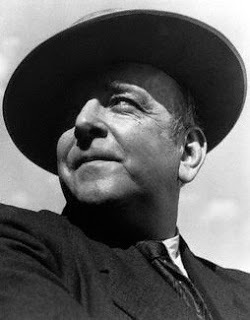
Published on May 03, 2016 01:00
May 1, 2016
Sunday Book: Sometimes a River Song by Avril Joy
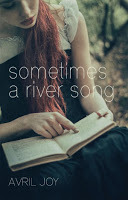 Sometimes a River Song is a lyrical novel about a young girl who lives on the river boats of the Mississippi with her family. Aiyana’s never known anything else, but America’s being gripped by a depression and times are changing. It’s a brutal, subsistence life on the river. ‘River rats is what the townsfolk call us and they don’t mean good by it,’ Aiyana says. Her father is more violent than most of the men in his community. He is particularly cruel towards Aiyana, for reasons she doesn’t understand until later in the novel. ‘. . daddy say I belong to the river and I belong to him and he will do with me as he see fit’.
Sometimes a River Song is a lyrical novel about a young girl who lives on the river boats of the Mississippi with her family. Aiyana’s never known anything else, but America’s being gripped by a depression and times are changing. It’s a brutal, subsistence life on the river. ‘River rats is what the townsfolk call us and they don’t mean good by it,’ Aiyana says. Her father is more violent than most of the men in his community. He is particularly cruel towards Aiyana, for reasons she doesn’t understand until later in the novel. ‘. . daddy say I belong to the river and I belong to him and he will do with me as he see fit’.She thinks it’s because she was almost drowned as a baby and has a number of health problems as a result. And she is the only member of the family with red hair. Her difference makes her quiet and watchful. Unlike her brothers and sisters she’s never been sent to school and she has never learned to read or write. She has to teach herself in secret because she knows that knowledge is power. She plans her escape, but time and time again she is pushed back. Her freedom eventually comes in a very unexpected way.
This is one of the most moving books I’ve read in a long time. The narrative itself is song-like in the way the prose moves. It reminded me initially of Eimear McBride’s ‘A Girl is a Half-Formed Thing’, mainly because the narrative voice of the girl is so distinctive and haunting.

The author, Avril Joy , was the first winner of the Costa short story award, with ‘Millie and Bird’. That story has been much anthologised and my reading group absolutely loved it. Avril’s written three previous books, all very different from each other. I’ve enjoyed all of them, but this is definitely her best. I could have gone on listening to that voice for ever.
Sometimes a River Song is published by Linen Press, a boutique publisher specialising in women’s writing. It’s also available from Amazon as an e-book and, from 27th April, in paperback in all good bookshops (and Amazon whatever it says about delivery!).
Linen Press - Fine writing by women for women
Order direct from Linen Press
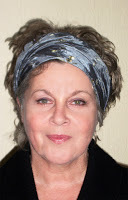 Also by Avril Joy
Also by Avril JoyMillie and Bird - Tales of Paradise, Iron Press, 2015
The Orchid House - Room to Write (currently free on Kindle Unlimited)
The Sweet Track - Flambard Press
For more information please visit Avril's website 'Write what you love - love what you write'.
Published on May 01, 2016 10:40
April 30, 2016
Braving the Northern weather - Tales from the river bank
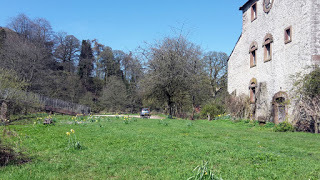 Finally! spring at the Mill.'April,' wrote TS Eliot, 'is the cruelest month.' And it's certainly been that up in the Lake District. But Eliot can't have been much of a gardener because he adds 'breeding Lilacs out of the dead land', and you've got to be joking if you can get Lilac to bloom in April here! Mine doesn't even have a leaf on it (and it's May tomorrow) and my early Magnolia has only just opened its first buds. My garden still resembles the Waste Land.
Finally! spring at the Mill.'April,' wrote TS Eliot, 'is the cruelest month.' And it's certainly been that up in the Lake District. But Eliot can't have been much of a gardener because he adds 'breeding Lilacs out of the dead land', and you've got to be joking if you can get Lilac to bloom in April here! Mine doesn't even have a leaf on it (and it's May tomorrow) and my early Magnolia has only just opened its first buds. My garden still resembles the Waste Land.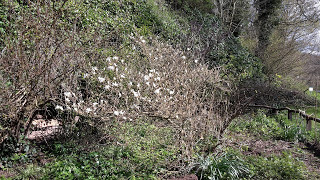 a few buds opening today on the magnolia stellataIt has snowed (the fells are still white) enough to build a snowman; it has hailed globs of ice the size of marbles and it has frozen and thawed and rained and blown in a way that would do February proud.
a few buds opening today on the magnolia stellataIt has snowed (the fells are still white) enough to build a snowman; it has hailed globs of ice the size of marbles and it has frozen and thawed and rained and blown in a way that would do February proud.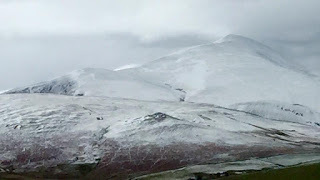 Caldbeck Fells, photo by my lovely aunt Anne Campbell
Caldbeck Fells, photo by my lovely aunt Anne CampbellBut today, with great irony, the weather turned and the sun was warm enough to brave the garden in a T-shirt.
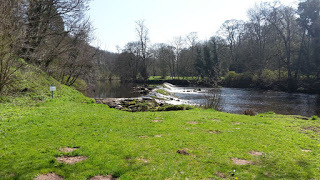 The sun on the weirAnd the tulips - planted before the floods and surviving being underwater - are out!
The sun on the weirAnd the tulips - planted before the floods and surviving being underwater - are out! 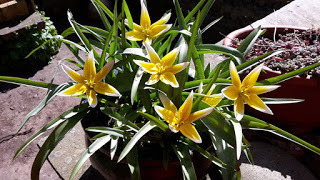
Tomorrow it's apparently to be winter again - but then there's a Bank Holiday on Monday! Have a good weekend everyone.
Published on April 30, 2016 14:16
April 26, 2016
Tuesday Poem: Mural - Mahmoud Darwish
On the anniversary of Chernobyl, this seemed very appropriate. Many of those eventually evacuated weren't allowed to take any personal possessions at all, though most did. One woman even smuggled out her cat! Many later died from their exposure to radiation.
Death, wait while I pack my bag: a toothbrush, soap, a razor, cologne and clothes.
Is the weather mild there?
Does the weather in white eternity change?
Does it stay as it is in both autumn and winter?
Will one book be enough for me
to kill the no-time, or will I need a full library?
What language do they speak there . . .?
Death, O my shadow who leads me, O my third person,
emerald and olivine’s irresolute color,
blood of a peacock, sniper of the world’s heart,
sickness of imagination, have a seat.
Leave your hunting gear at the window and hang your heavy key chain on the door.
Mighty one, don’t gaze into my veins looking for some fatal flaw.
You are stronger than my breathing, stronger than medicine, and the strong honey of bodily love. . .
Death, wait.
Have a seat and a glass of wine, but don’t argue with me.
One such as you shouldn’t argue with a mortal being.
As for me, I won’t defy the servant of the Unseen.
Relax. Perhaps you are exhausted today,
dog-tired of warfare among the stars.
Who am I that you should pay me a visit?
Do you have the time to consider my poem?
Ah, no. it’s none of your affair.
You are charged only with the earthly body of man,
not with his words and deeds.
O death, all the arts have defeated you, all the Mesopotamian songs.
The Egyptian obelisk, the Pharaoh’s tombs, the engraved temple stones, all defeated you, all were victorious.
You cannot trap the immortal.
So do with us and with yourself whatever you wish.
I wish to live. I have work to do on this volcanic bit of geography.
Ever since the days of Lot, until the apocalypse of Hiroshima,
devastation has always been devastation.
I want to live here as if I am, forever,
burning with lust for the unknown.
Maybe “now” is much more distant. Maybe “yesterday” is nearer
and “tomorrow” already in the past.
But I grasp the hand of “now” that History may pass near me,
and not time that runs in circles, like the chaos of mountain goats.
from 'Mural', included in Unfortunately it was Paradise
published by University of California Press
Copyright the Estate of Mahmoud Darwish
Mahmoud Darwish is the poet laureate of the Palestinian diaspora, but his work goes much wider and has a universal relevance. These are extracts from a very long poem, ‘Mural’, contained in his selected poems called Unfortunately, It Was Paradise . ‘Dreams,’ he asserts, ‘are our sole utterance.’ Art is more powerful than war, oppression, suppression and human stupidity. In the poem he contemplates the role of the artist and the difficulty of testifying in a world where the ‘victim’ is sometimes pressured into changing ‘his testimony and where ‘the actor and audience’ have ‘disappeared from view’.
‘At the door, I sat wondering: Am I he?
This is the language, this sound is the color of my blood.
Yet the author is not ‘I’.
If I come but don’t arrive, this ‘I’ isn’t me.
If I talk but don’t say anything, this ‘I’ isn’t me.
Obscure inscriptions translate themselves: ‘Write to be. Read to find’.’
Written in 2000, before 9/11 changed everything, before the current Syrian atrocity, Darwish reflects on an older conflict.
‘In the shattered amphora, the women of the Syrian coast
moan on their endless trail and burn under the August sun.
Before I was born, I saw them on the footpath to the fountain.
I heard the water in their pottery mourning them . .'
The poet asks, ‘Who is next after Babylon?’ Darwish uses the Palestinian experience as ‘a metaphor for the loss of Eden , for the sorrows of dispossession and exile’. Influenced as a young man by the Hebrew poet Yehuda Amichai, Mahmoud Darwish is a poet of international significance, like Neruda, Lorca, Eliot, or Yeats, and is disgracefully unread in the west. He is incredibly lyrical, (a random line from ‘The Raven’s Ink’ - “O bell of dusk with the dark voice!”) but often uses that lyricism to contrast with the brutality of political reality. "All the birds followed/ My hand to the barriers of a distant airport./ All the wheatfields/ All the prisons/ All the white graves/ All the borders/ All the waving handkerchiefs/ All the dark eyes/ All the eyes/ Were with me/ But they crossed them out of the passport."
In this collection the older Darwish faces his own death. ‘What does life say to Mahmoud Darwish?/ You lived, fell in love, learned, and all those you will finally love are dead?’ But the poet’s answer is one of survival through art. ‘Until my heart stops, I will slog over this endless, endless road . . .’ Darwish’s heart stopped suddenly in 2008, aged 66, in exile in Houston, Texas.
My favourite translator of his work is Abdullah al-Udhari, born in Yemen and a contemporary of Darwish. Al-Udhari read classical arabic at London University and edited TR - an anglo-arab literary magazine. There is a brilliant selection of Darwish’s poems in Modern Poetry of the Arab World, a slim paperback translated by Al-Udhari. Many of Darwish’s poems have been set to music, notably by the Palestinian singer Reem Kelani. (Mawwaal - ‘Variations on Loss’ from the CD Sprinting Gazelle) Here she is singing with Jewish musician Gilad Atzmon. A film has also been made of his love affair with a Jewish woman, " Write Down, I Am an Arab" by the female filmmaker Ibtisam Mara'ana Menuhin, herself an Arab woman married to a Jewish man. Made in 2014, it contains wonderful footage of Mahmoud Darwish’s life and work. This has English subtitles.
Death, wait while I pack my bag: a toothbrush, soap, a razor, cologne and clothes.
Is the weather mild there?
Does the weather in white eternity change?
Does it stay as it is in both autumn and winter?
Will one book be enough for me
to kill the no-time, or will I need a full library?
What language do they speak there . . .?
Death, O my shadow who leads me, O my third person,
emerald and olivine’s irresolute color,
blood of a peacock, sniper of the world’s heart,
sickness of imagination, have a seat.
Leave your hunting gear at the window and hang your heavy key chain on the door.
Mighty one, don’t gaze into my veins looking for some fatal flaw.
You are stronger than my breathing, stronger than medicine, and the strong honey of bodily love. . .
Death, wait.
Have a seat and a glass of wine, but don’t argue with me.
One such as you shouldn’t argue with a mortal being.
As for me, I won’t defy the servant of the Unseen.
Relax. Perhaps you are exhausted today,
dog-tired of warfare among the stars.
Who am I that you should pay me a visit?
Do you have the time to consider my poem?
Ah, no. it’s none of your affair.
You are charged only with the earthly body of man,
not with his words and deeds.
O death, all the arts have defeated you, all the Mesopotamian songs.
The Egyptian obelisk, the Pharaoh’s tombs, the engraved temple stones, all defeated you, all were victorious.
You cannot trap the immortal.
So do with us and with yourself whatever you wish.
I wish to live. I have work to do on this volcanic bit of geography.
Ever since the days of Lot, until the apocalypse of Hiroshima,
devastation has always been devastation.
I want to live here as if I am, forever,
burning with lust for the unknown.
Maybe “now” is much more distant. Maybe “yesterday” is nearer
and “tomorrow” already in the past.
But I grasp the hand of “now” that History may pass near me,
and not time that runs in circles, like the chaos of mountain goats.
from 'Mural', included in Unfortunately it was Paradise
published by University of California Press
Copyright the Estate of Mahmoud Darwish
Mahmoud Darwish is the poet laureate of the Palestinian diaspora, but his work goes much wider and has a universal relevance. These are extracts from a very long poem, ‘Mural’, contained in his selected poems called Unfortunately, It Was Paradise . ‘Dreams,’ he asserts, ‘are our sole utterance.’ Art is more powerful than war, oppression, suppression and human stupidity. In the poem he contemplates the role of the artist and the difficulty of testifying in a world where the ‘victim’ is sometimes pressured into changing ‘his testimony and where ‘the actor and audience’ have ‘disappeared from view’.
‘At the door, I sat wondering: Am I he?
This is the language, this sound is the color of my blood.
Yet the author is not ‘I’.
If I come but don’t arrive, this ‘I’ isn’t me.
If I talk but don’t say anything, this ‘I’ isn’t me.
Obscure inscriptions translate themselves: ‘Write to be. Read to find’.’
Written in 2000, before 9/11 changed everything, before the current Syrian atrocity, Darwish reflects on an older conflict.
‘In the shattered amphora, the women of the Syrian coast
moan on their endless trail and burn under the August sun.
Before I was born, I saw them on the footpath to the fountain.
I heard the water in their pottery mourning them . .'
The poet asks, ‘Who is next after Babylon?’ Darwish uses the Palestinian experience as ‘a metaphor for the loss of Eden , for the sorrows of dispossession and exile’. Influenced as a young man by the Hebrew poet Yehuda Amichai, Mahmoud Darwish is a poet of international significance, like Neruda, Lorca, Eliot, or Yeats, and is disgracefully unread in the west. He is incredibly lyrical, (a random line from ‘The Raven’s Ink’ - “O bell of dusk with the dark voice!”) but often uses that lyricism to contrast with the brutality of political reality. "All the birds followed/ My hand to the barriers of a distant airport./ All the wheatfields/ All the prisons/ All the white graves/ All the borders/ All the waving handkerchiefs/ All the dark eyes/ All the eyes/ Were with me/ But they crossed them out of the passport."
In this collection the older Darwish faces his own death. ‘What does life say to Mahmoud Darwish?/ You lived, fell in love, learned, and all those you will finally love are dead?’ But the poet’s answer is one of survival through art. ‘Until my heart stops, I will slog over this endless, endless road . . .’ Darwish’s heart stopped suddenly in 2008, aged 66, in exile in Houston, Texas.
My favourite translator of his work is Abdullah al-Udhari, born in Yemen and a contemporary of Darwish. Al-Udhari read classical arabic at London University and edited TR - an anglo-arab literary magazine. There is a brilliant selection of Darwish’s poems in Modern Poetry of the Arab World, a slim paperback translated by Al-Udhari. Many of Darwish’s poems have been set to music, notably by the Palestinian singer Reem Kelani. (Mawwaal - ‘Variations on Loss’ from the CD Sprinting Gazelle) Here she is singing with Jewish musician Gilad Atzmon. A film has also been made of his love affair with a Jewish woman, " Write Down, I Am an Arab" by the female filmmaker Ibtisam Mara'ana Menuhin, herself an Arab woman married to a Jewish man. Made in 2014, it contains wonderful footage of Mahmoud Darwish’s life and work. This has English subtitles.
Published on April 26, 2016 04:45



